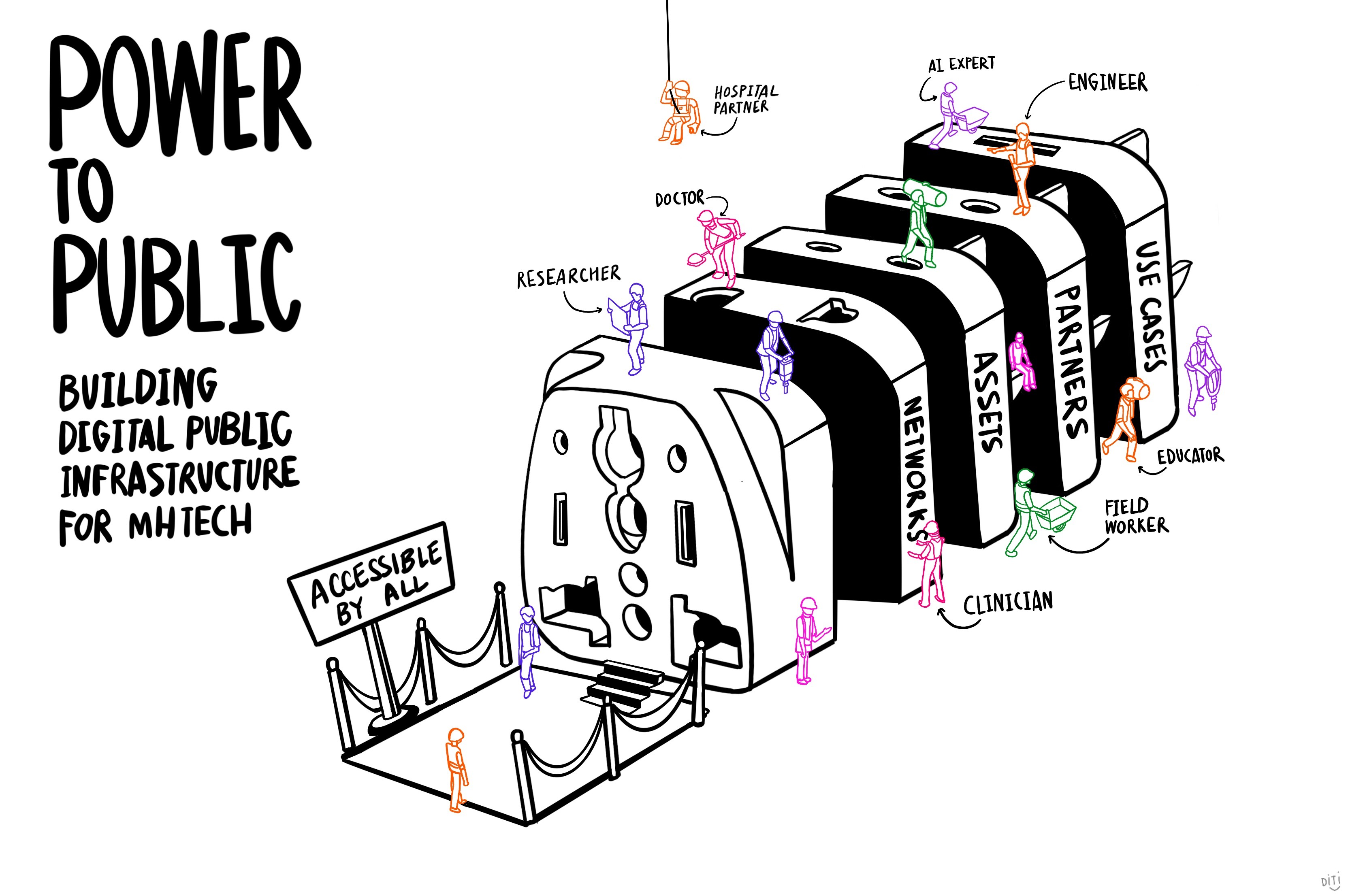Sukoon: An AI-enabled ecosystem approach to India's mental health gaps
There’s something both wildly scary and exciting about doing things for the first time. But what about the very first time? No precedent at all. Probably treads closer to the scary side.
When people ask me to explain what exactly we do at project Sukoon, I try to compress it into a one-liner, anticipating the inevitable follow-ups. So I wanted to use this piece to break it down for you, just like in conversation.
At Sukoon, we take a DPI approach to developing solutions across various mental health contexts using artificial intelligence.
I know, it’s a mouthful. So let’s dig in…
1. What is Digital Public Infrastructure (DPI)?
You know Aadhaar, UPI – these are built DPIs and have been instrumental in redefining what is possible at population-scale. This infrastructure is based on the key principles of open-source development and interoperability.
Think of it like a universal power outlet that allows any device to plug in and work. Just as a standard extension cord enables countless appliances to function, DPI provides a common digital foundation that various services and applications can build upon, making it easier for everyone to access and use at scale.

Illustration by Aditi Shinde, a design student of NID - Ahmedabad.
2. What do you mean by mental health contexts?
Mental health encompasses our emotional, psychological, and social well-being, affecting how we think, feel, and act. It's crucial at every stage of life, from childhood through adulthood. At Sukoon, we recognize that mental health solutions need to be tailored to diverse contexts and co-create solutions for end users, practitioners and front-line workers.
This may look like building tools to support a student dealing with exam stress, a community health worker caring for rural families or even a GP conducting initial screenings to triage more effectively. As such, contexts extend themselves to prevention, early intervention, community and social support but also research, policy and governance.
Considering these various contexts enables us to think through solutions more comprehensively and address the full spectrum of mental health needs in a population.
3. And lastly, artificial intelligence?
I hesitate each time I use the phrase because people immediately assume we are trying to replace 6 years of medical school with something engineers created on the other side of the world. That is the last thing we are trying to do.
This is a way of leveraging the tools at hand to support capacity building to the best we can. What AI is really good at is understanding natural language which is how we typically describe our mental state.
One may not know the language to articulate the abuse they’ve endured, but through stories, narratives, and courses created by people and personalized with AI, they can gain the expression they never had before, enabling them to recognize the help they need.
And now what do all these mean together?
The intersection of mental health contexts, DPI thinking, and AI allows us to explore a variety of use cases at population scale. These can be:
Open-source AI models trained on diverse Indian mental health data, which can then be leveraged by developers and organizations.
Standardized APIs for accessing mental health resources and insights.
Frameworks and systems to ensure ethical use of AI in mental health, protecting privacy and preventing bias.
DPIs differ from DPGs in that they are typically more foundational and create the underlying infrastructure upon which various applications, services, and DPGs can be built. For example, while a mental health chatbot might be a DPG, the underlying natural language processing model and data standards it uses could be part of a DPI.
So consider a scenario where a grassroots health worker needs help recognizing the symptoms of an illness but lacks access to a healthcare professional. We could provide them with a screening tool developed in collaboration with India’s leading institutions in the field.
Or think of a farmer facing economic distress. A family member might benefit from knowing how to create a space where the problem is viewed as a collective family issue, not just the burden of the 'head' of the family. They could discover organizations that work with farmers experiencing distress and suicidal ideation.
It may seem like we are flaring, but that’s what thinking at scale demands, to build for all contexts using some unified frameworks that can be adopted by others.
Why this approach?
Mental health challenges in India are deeply intertwined with social and economic factors such as poverty, lack of education, and societal norms. Traditional services often struggle with issues of awareness, accessibility, and affordability.
And for a lot of these issues, therapy will not be enough-we will need an ecosystem of doer’s to help people live better lives-holistically.
At Sukoon, we adopt a co-creation strategy that not only addresses these existing gaps but also anticipates future needs, fostering both sustainability and scalability. We believe that internal alignment within the mental health ecosystem is crucial, which is why we actively involve partner organizations – from government institutes to grassroot organizations - in our work.
This allows us to create adaptable, far-reaching solutions that are both culturally attuned and practical across diverse Indian settings.
It’s important for us to meet users where they’re at, and what this formally translates at scale is that change in societies must come from within, we cannot impose it on them. And so the goals we've established span multiple levels - from the macro (population/societal) to the micro (individual/community), and from the objective to the subjective.
Let's take a closer look at each
Macro Level (Population/Societal Outcomes): These reflect the broad, societal changes driven by our interventions, impacting the population's mental health and economic conditions.
Objective Aims: Reduced prevalence of mental health disorders, increased access to services, improved literacy, and decreased economic burden on the healthcare system.
Subjective Aims: Improved well-being and life satisfaction, enhanced community support, and increased feelings of empowerment.
Micro Level (Individual/Community Outcomes): These focus on the direct impact of our services on individuals and communities, aimed at personal health management and quality of life.
Objective Aims: Earlier detection and intervention, identification of core issues, improved treatment adherence, reduced hospitalizations, and better integration of mental healthcare.
Subjective Aims: Improved quality of life, enhanced personal agency, and increased satisfaction with mental healthcare services.
System-Level Outcomes: These address foundational improvements in infrastructure and policy frameworks that support and deliver mental healthcare.
Objective Aims: Creation of a scalable mental health DPI, development of culturally adapted AI models, establishment of ethical AI frameworks, and improved data-driven decision-making.
Subjective Aims: Increased trust in mental health services and confidence in Bharat's healthcare system.
These goals may seem audacious, but we like them that way. And we’re not saying we’re single-handedly going to “solve” but we think inching closer to a “solution” is both necessary and achievable.
Get involved
Our team consists of volunteers across product, engineering, design, growth and of course, our licensed medical professionals. If our work interests you and you’d like to get involved as a volunteer or a partner organization, reach out and let’s chat.
Academia / Researchers: We need help to support our research efforts and implement findings into practical solutions.
Government Officials / Policymakers: Your expertise can help devise mental health policy frameworks.
Mental Health Professionals: You can assist in implementing and refining our solutions.
Educators / School Administrators: Partner to foster mental health support and implement early intervention programs.
Corporates: You can help expand our reach by implementing workplace mental health programs to boost productivity and employee well-being.
Media and Influencers: Use your platform to break stigma and promote mental health awareness.
Volunteers / Community Leaders: Get involved directly with Sukoon or organize events to spread awareness in your community.
In the next piece we’ll dive deeper into how we measure our progress and share more about our current projects.
___________________
About the authors
Tanisha co-leads Project Sukoon with Luv at People+ai. Seeing first hand how imperative mental health is to wellbeing, she initiated Sukoon with the goal of improving Bharat’s relationship with a topic that remains highly stigmatized and often casually ignored. She also works with several pharma and healthcare SaaS companies on product development and go-to-market strategies. Prior to this, Tanisha worked in tech investment banking at Goldman Sachs in San Francisco. She is a two-time Bill & Melinda Gates scholar and Tanisha holds a BA in Mathematics & Economics from Claremont McKenna College.
Shashwat brings in the ecosystem oriented strategic thinking and leads partnerships at Project Sukoon with People+ai and is a Founder's Office Associate at VOPA. He landed in both places by serendipity, which he is coming to realise is one of the most important ingredients of discovery, innovation and co-creation. His passion for mental health comes from a deeply personal place and at Project Sukoon, he tries to fuse his lived experiences with the wisdom of the ecosystem to think about scale and rapid action. At VOPA, he volunteers to do anything and everything. He is grateful to Societal Thinking (an idea he found serendipitously) for giving him the language to articulate the future he envisions.

